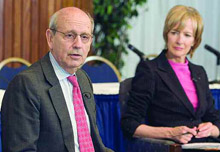
March 24, 2006 — What roles do the press, political parties and interest groups play in the Supreme Court nomination process? To answer the question, the Shorenstein Center brought together some of the country’s most prominent political activists, journalists, academics and government officials to discuss the ways in which a nominee’s candidacy for the nation’s highest court is influenced by the political process.
The day began with an historical overview of Supreme Court nominations. Discussants included Michael Comiskey, who moderated, Eleanor D. Acheson, Lyle Denniston and Mark Gitenstein.
Judy Woodruff and Linda Greenhouse moderated a panel on the liberal and conservative response to the resignation of Sandra Day O’Connor and the subsequent nomination of John G. Roberts Jr. to the court. Panelists included Brad Berenson, Ron Brownstein, Stephanie Cutter, Doug Kendall, Manuel Miranda, Ralph Neas, Grover Norquist, Greg Stohr, Fred Thompson, and Seth Waxman.
Next, Supreme Court Associate Justice Stephen Breyer took the floor. He spoke broadly about the court’s role in American democracy but declined to give his take on the nomination process (except as it pertained to his own nomination), suggesting it would be impolitic to do so. Nonetheless, he was emphatic about the need for the court — and each of its members — to operate with complete freedom, free from partisan influence. “If you are the least popular person in the United States in a court of the United States, you would like a judge who is not moved by the fact that you happen to be unpopular. That’s what judicial independence is. It’s never perfect, but that’s the ideal that you’re striving toward,” Breyer said.“…we, the judges of course, who work at the boundaries, have to understand that that space means decisions are there for others, through their legislatively elected representatives and, vice versa, that we’re not there to do a legislative job; we’re there to do the boundary patrol job. And that requires independence, some insulation from public opinion, and that I think is that those who are in the legislature have to and do tend to understand about the nature of the job they’re appointing an individual to on the Supreme Court or any other federal court.”
The day ended with a lively discussion about the president’s decision to nominate Harriet Miers and the subsequent appointment of Samuel Alito to the bench. Panelists included Nan Aron, Dan Balz, Rachel Brand, Walter E. Dellinger III, Helaine Greenfeld, Wade Henderson, Ted Olson, Sean Rushton, and Nina Totenberg. Jeffrey Toobin and Judy Woodruff moderated.
Video:
Justice Breyer: The Role of the Supreme Court in American Democracy
Supreme Court Justice Stephen Breyer discussed the Supreme Court and its role in American democracy. Among the topics he addressed were his understanding of the Constitution and how it had evolved during his time on the court, the role of the people and other branches of government in establishing democratic institutions, and the use of comparisons between the U.S. legal system and foreign understanding of the rule of law.
Panel: Nominations of Harriet Miers and Samuel Alito
Panelists discussed the nomination of Harriet Miers and the subsequent nomination of Samuel Alito to the Supreme Court. Among the topics they addressed were the appointment and confirmation process, reactions by the public, private interests, and lawmakers to the two nominations, and various that surfaced about the nominees prior to Senate Judiciary Committee hearings on the nominations.
Panel: John Roberts Supreme Court Nomination
Panelists spoke about preparations for the consideration of President Bush’s first Supreme Court appointment and nomination, the impact of Justice O’Connor’s resignation and Chief Justice Rehnquist’s on the make up of the court, and the eventual selection of John Roberts as the nominee for chief justice. They also talked about the confirmation process, the influence of special interests, and the role of the judiciary.

